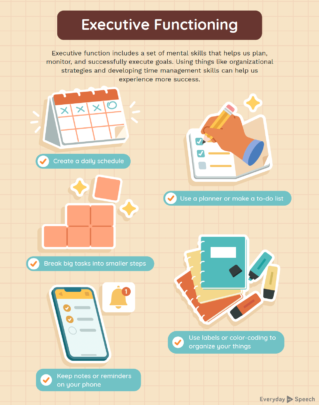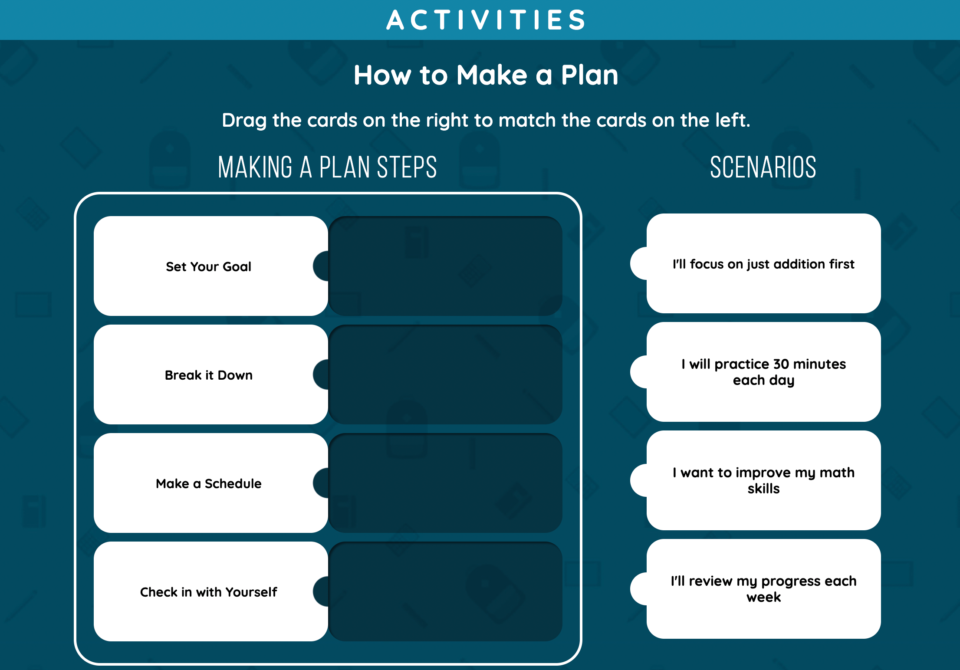
Teaching executive functioning strategies to elementary students is crucial for their academic success and overall development. Among these strategies, task initiation and making a plan are foundational skills that can significantly impact a child’s ability to learn and achieve. Set your learners up for success with the following 5 strategies to teach an elementary task initiation lesson!
Elementary Task Initiation Lesson
Task initiation and planning are critical components of executive functioning. Task initiation refers to the ability to begin tasks without undue procrastination, while planning involves the ability to create a roadmap to reach a goal or complete a task. Together, these skills enable students to embark on learning activities with confidence and direction.
Lesson Plan: Fostering Task Initiation and Planning
Below is a detailed lesson plan that includes engaging, simple-to-implement games and activities designed to enhance elementary students’ task initiation and planning skills.
Objectives
- To improve students’ ability to start tasks promptly.
- To develop students’ planning skills for academic tasks.
- To encourage self-reflection on the task initiation and planning process.
Materials Needed
- Task cards with various simple activities (e.g., draw a house, write your name backwards).
- A timer.
- Planning worksheets (templates provided at the end of the post).
- Storybooks featuring characters facing and overcoming planning challenges.
Activities Overview
- The Quick Start Game
- Planning Puzzle
- Storytime Reflection
- Plan-Do-Review Cycle
The Quick Start Game
Objective: To improve task initiation through a fun and competitive activity.
- Procedure: Distribute a task card to each student. Set a timer for a short duration (e.g., 2 minutes). Challenge students to start the task as quickly as possible after the timer starts. Discuss what made it easy or difficult to start.
- Discussion Points: Encourage students to reflect on what helped them begin the task quickly and what distractions they had to overcome.
Planning Puzzle
Objective: To practice breaking down tasks into smaller, manageable steps.
- Procedure: Present a complex task (e.g., organizing a bookshelf). Have students use the planning worksheets to outline steps to complete the task. They can work in small groups to encourage collaboration.
- Discussion Points: Highlight the importance of planning and how it can make daunting tasks feel more manageable.
Storytime Reflection
Objective: To identify task initiation and planning strategies through storytelling.
- Procedure: Read a storybook to the class that features a character facing a challenge that requires planning. Discuss the story, focusing on how the character planned their actions.
- Discussion Points: Ask students to think about how they would plan differently if they were in the character’s situation.
Plan-Do-Review Cycle
Objective: To encourage self-reflection and adjustment of planning strategies.
- Procedure: Students select a personal goal or task, outline a plan using the planning worksheet, execute the plan over a set period, and then review their performance.
- Discussion Points: Emphasize the importance of reviewing what worked, what didn’t, and how plans could be adjusted in the future.
Everyday Speech Making a Plan Interactive Worksheet
Objective: To encourage practice and application of planning strategies.
- Procedure: Students can work either individually or in a group setting to complete the worksheet (see image below). Everyday Speech provides either digital versions of worksheets to play onscreen for an interactive experience or the option to simply print them out.
- Discussion Points: Review correct and incorrect answers together with your students to ensure comprehension.

Unlock free materials by signing up for your free trial today – no credit card required!
Get your materials here!
Instant access to thousands of no-prep social skills activities, over 1000+ video lessons, and engaging games designed to enhance learning and development.
Sample Video
Students learn best from watching real students their own age model skills. Try out this sample video lesson. We offer our entire Social-Emotional Learning platform free for 14 days here!










